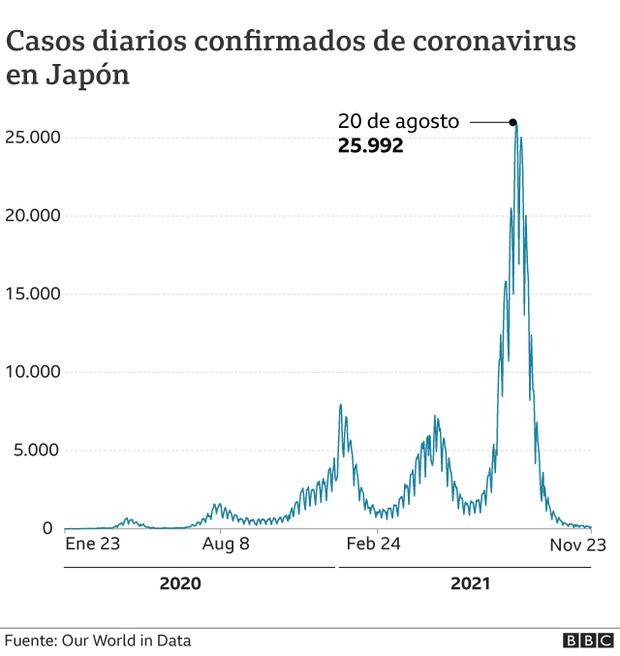Delta variant of coronavirus | "turn to extinction": The strange path of the mutation baffles scientists in Japan | Technique

Last August, Japan was in the middle of the fifth and largest wave of the coronavirus since the outbreak began. It came to record more than 20,000 daily cases.
This regrowth was largely driven by a delta variant that swept the globe and which, due to its high transmissibility, ended up replacing other mutations of the pathogen.
But that month was also a turning point for the Asian country.
Since then Cases have decreased at an astonishing rate Today, while many countries with a similar vaccination rate are battling a new wave of infections, Japan is breathing easy and this Tuesday, November 23, it recorded more than 100 new infections.
According to a group of scientists, the explanation taking power in this perplexing drop in cases is that the delta variable can, quite literally, “self-destruct.”
Is this possible? Could it be repeated in other parts of the world?
Multiple reasons
Several hypotheses may be behind this sudden drop in cases and the occurrence of the delta variable.
More than 75% of the population in Japan has already been vaccinated, and residents are closely following social distancing measures and widespread use of masks.

But other countries meet similar requirements and record many daily cases.
In Spain, for example, 80% of the population has already received a full vaccination and masks continue to be used indoors.
And this Tuesday, despite having a third of Japan’s population, it has recorded nearly 7,000 daily cases.
It is this kind of comparison that prompted Japanese scientists, based on genetic observations, to approach the “self-extinction” hypothesis of the delta variable.
“The delta variant in Japan was highly contagious and far away from the other variants. But with the accumulation of mutations, we think it has become Faulty virus unable to reproduceGeneticist Itoro Inoue of the National Institute of Genetics in Japan told the newspaper Japan Times.
“Given that cases have not increased, we believe that at some point during these mutations the virus moved directly towards it their natural extinctionInoue added.
Inoue’s theory sheds some light on the sudden disappearance of the delta variable in Japan that surprised many.
Especially considering that many Western countries have recently, with advanced vaccinations, been forced to resume strict containment measures.

But Japan appears to be an odd case as coronavirus cases have fallen in free fall despite the fact that trains and restaurants have been full since the last state of emergency ended last October.
Usual operation
The disappearance of the various variants of the virus is a thing It has been going on since the beginning of the epidemic.
“It happens all the time in animal and human viruses. Let’s remember that alpha, beta and gamma variants have mostly been replaced by delta variants,” virologist Julian Tang, from the University of Leicester in the UK, contextualized for BBC Mundo.
“This is actually a matter of viral fitness in any host. Perhaps something in the immunity of the Japanese population has changed the way the virus behaves there. Time will tell if it will also happen in another countryTang adds.
Previous studies have demonstrated that more people in Asia have a defense enzyme called APOBEC3A that attacks different viruses, including the coronavirus that causes covid-19, than people in other regions such as Africa and Europe.
In this way, researchers from the National Institute of Genetics and Niigata University studied whether this enzyme could inhibit the activity of the coronavirus.
The team compared genetic diversity data for delta and alpha variants in infected clinical samples in Japan between June and October.
During the study, they noticed that the mutations of the virus seemed to stop abruptly in the middle of its evolutionary development, They became defective And prevent the reproduction of the virus.

“They found mutations in the protein nsp14, which is related to repairing replication defects. If there are more mutations than normal in this protein, these are It can disable it or make it ineffective, which can cause catastrophe in the pathogen”, explains Professor José Manuel Bautista, Professor of Biochemistry and Molecular Biology at the Complutense University of Madrid in Spain.
Although Bautista believes the sudden drop in cases is also due to factors such as mass vaccination and distancing measures, the steepness of the infection curve is staggering.
“The normal thing is that it decreases little by little if people self-isolate, because already infected people continue to be notified days later. The decrease in cases is very dramatic and exaggerated and suggests that the theory of self-destruction is possible,” the academic adds.
Despite the sudden drop in the number of cases in Japan, scientists are being cautious and avoiding making diagnoses about what might happen in the future.
The epidemic is constantly evolving and it has shown that despite vaccinations and containment measures, The world is not yet safe from new shoots.

“Travel enthusiast. Alcohol lover. Friendly entrepreneur. Coffeeaholic. Award-winning writer.”




